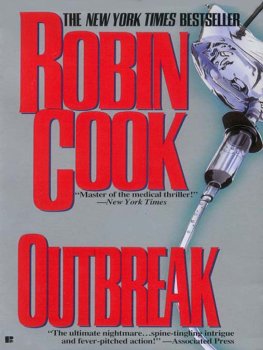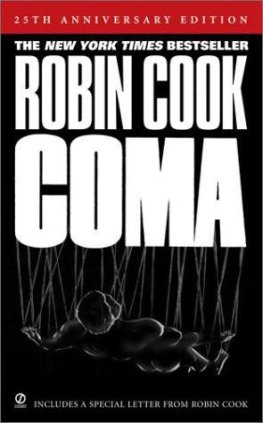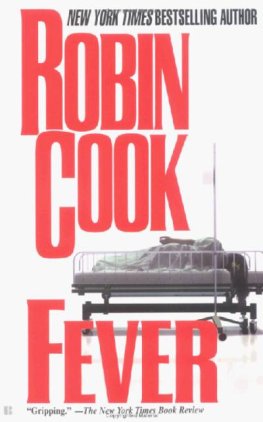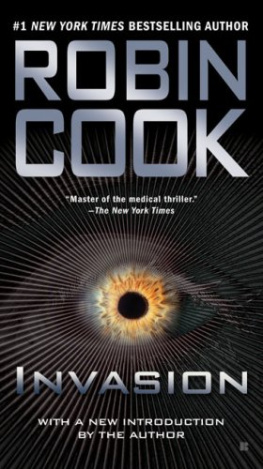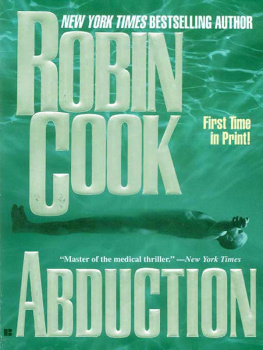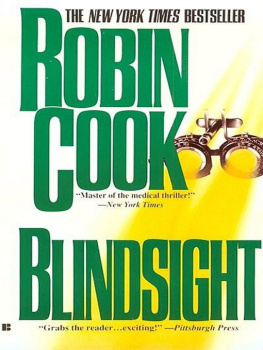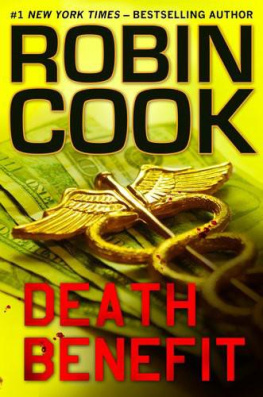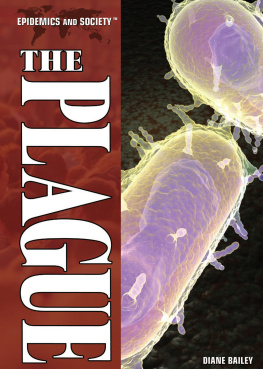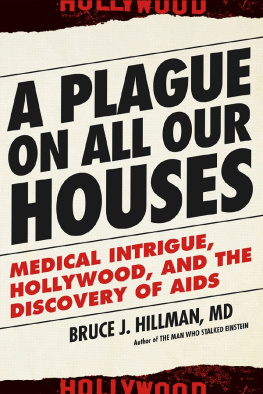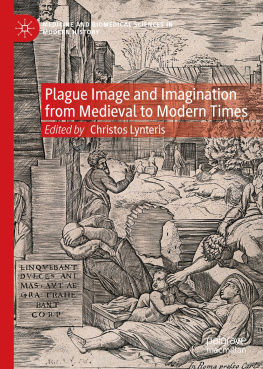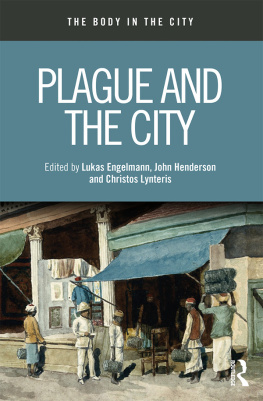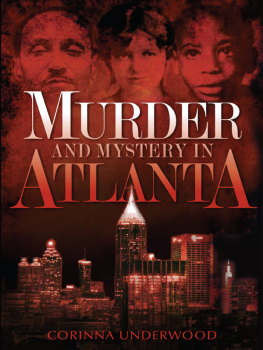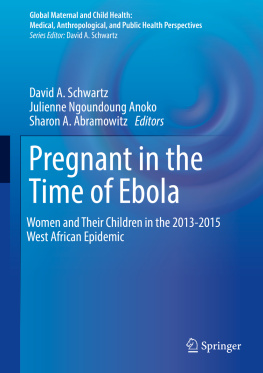Robin Cook - Outbreak
Here you can read online Robin Cook - Outbreak full text of the book (entire story) in english for free. Download pdf and epub, get meaning, cover and reviews about this ebook. City: New York, year: 2002, publisher: Berkley Books, genre: Detective and thriller. Description of the work, (preface) as well as reviews are available. Best literature library LitArk.com created for fans of good reading and offers a wide selection of genres:
Romance novel
Science fiction
Adventure
Detective
Science
History
Home and family
Prose
Art
Politics
Computer
Non-fiction
Religion
Business
Children
Humor
Choose a favorite category and find really read worthwhile books. Enjoy immersion in the world of imagination, feel the emotions of the characters or learn something new for yourself, make an fascinating discovery.
- Book:Outbreak
- Author:
- Publisher:Berkley Books
- Genre:
- Year:2002
- City:New York
- ISBN:978-1-1012-0348-4
- Rating:5 / 5
- Favourites:Add to favourites
- Your mark:
- 100
- 1
- 2
- 3
- 4
- 5
Outbreak: summary, description and annotation
We offer to read an annotation, description, summary or preface (depends on what the author of the book "Outbreak" wrote himself). If you haven't found the necessary information about the book — write in the comments, we will try to find it.
Outbreak — read online for free the complete book (whole text) full work
Below is the text of the book, divided by pages. System saving the place of the last page read, allows you to conveniently read the book "Outbreak" online for free, without having to search again every time where you left off. Put a bookmark, and you can go to the page where you finished reading at any time.
Font size:
Interval:
Bookmark:
Robin Cook
OUTBREAK
For my mother, Audrey, who ultimately is responsible for all this.
Prologue
A TWENTY-ONE-YEAR-OLD Yale biology student by the name of John Nordyke woke up at dawn at the edge of a village north of Bumba, Zaire. Rolling over in his sweat-drenched sleeping bag, he stared out through the mesh flap of his nylon mountain tent, hearing the sounds of the tropical rain forest mixed with the noises of the awakening village. A slight breeze brought the warm, pungent odor of cow dung permeated with the acrid aroma of cooking fires. High above him he caught glimpses of monkeys skittering through the lush vegetation that shielded the sky from his view.
He had slept fitfully, and as he pulled himself upright, he was unsteady and weak. He felt distinctly worse than he had the night before, when hed been hit by chills and fever an hour or so after dinner. He guessed he had malaria even though hed been careful to take his chloroquine phosphate as prophylaxis against it. The problem was that it had been impossible to avoid the clouds of mosquitoes that emanated each evening from the hidden pools in the swampy jungle.
With a hesitant gait, he made his way into the village and inquired about the nearest clinic. An itinerant priest told him that there was a Belgian mission hospital in Yambuku, a small town located a few kilometers to the east. Sick and frightened, John quickly broke camp, stuffed his tent and sleeping bag into his backpack and set out for Yambuku.
John had taken a six-month leave from college to photograph African animals, such as the highland gorilla, which were threatened by extinction. It had been his boyhood dream to emulate the famous nineteenth-century explorers who had originally opened the Dark Continent.
Yambuku was scarcely larger than the village hed just left, and the mission hospital did not inspire confidence. It was no more than a meager collection of cinder-block buildings, all in dire need of repair. The roofs were either rusting corrugated metal or thatched like the native huts, and there seemed no signs of electricity.
After checking in with a nun, swathed in traditional attire, who spoke only French, John was sent to wait among a throng of natives in all states of debility and disease. Looking at the other patients, he wondered if he wasnt likely to catch something worse than what he already had. Finally he was seen by a harried Belgian doctor who could speak a little English, though not much. The examination was rapid, and as John had already surmised, the diagnosis was a touch of malaria. The doctor ordered an injection of chloroquine and advised John to return if he didnt feel better within the next day or so.
The examination over, John was sent into the treatment room to wait in line for his injection. It was at that point that he noticed the lack of aseptic technique. The nurse did not have disposable needles but merely rotated one of three syringes. John was certain that their short stay in the sterilizing solution was not nearly long enough to render them germ-free. Besides, the nurse fished them out of the fluid with her fingers. When it became his turn, he was tempted to say something, but his French was not fluent enough, and he knew he needed the medicine.
During the next few days, John was glad that hed been silent since he soon was feeling better. He stayed in the Yambuku area, occupying himself by photographing the Budza tribesmen. They were avid hunters and eager to demonstrate their prowess to the blond foreigner. By the third day John was preparing to recommence his journey up the Zaire River, following Henry Stanleys footsteps, when his health took a rapid turn for the worse. The first thing he noticed was a violent headache, followed in rapid succession by chills, fever, nausea and diarrhea. Hoping it would pass, he took to his tent and shivered through the night, dreaming of home with clean sheets and a bathroom down the hall. By morning he felt weak and dehydrated, having vomited several times in the darkness. With great difficulty, he got his things together and made his way slowly to the mission hospital. When he arrived in the compound, he vomited bright red blood and collapsed on the clinic floor.
An hour later he woke in a room occupied by two other patients, both suffering from drug-resistant malaria.
The doctor, the same man whod examined John on his previous visit, was alarmed by the severity of Johns condition and noted some curious additional symptoms: a strange rash over his chest and small surface hemorrhages in his eyes. Although the doctors diagnosis was still malaria, he was troubled. It was not a typical case. As an added precaution, he decided to include a course of chloramphenicol in case the boy had typhoid fever.
September 16, 1976Dr. Lugasa, District Health Commissioner for the Bumba region, glanced out the open window of his office at the expanse of the Zaire River as it shimmered in the morning sunlight. He wished it was still called the Congo with all the mystery and excitement that name invoked. Then, forcing his mind back to work, he looked again at the letter hed just received from the Yambuku Mission Hospital concerning the deaths of an American male, one John Nordyke, and of a visiting farmer from a plantation near the Ebola River. The mission doctor claimed that their deaths had been caused by an unknown infection that spread rapidly; two patients housed with the American, four members of the planters household whod been caring for the farmer, and ten of the clinics outpatients had come down with severe cases of the same illness.
Dr. Lugasa knew that he had two choices. First, he could do nothing, which was undoubtedly the wisest choice. God knew what kind of rampant endemic diseases there were out there in the bush. His second option was to fill out the bewildering array of official forms reporting the incident to Kinshasa where someone like himself, but higher on the bureaucratic ladder, would probably decide it was prudent to do nothing. Of course Dr. Lugasa knew that if he elected to fill out the forms, he would then be obligated to journey up to Yambuku, an idea that was particularly odious to him at that particularly damp, hot time of year.
With a twinge of guilt, Dr. Lugasa let the onionskin letter slip into the wastebasket.
September 23, 1976A week later Dr. Lugasa was nervously shifting his weight from one foot to the other as he watched the aged DC-3 aircraft land at the Bumba airport. First out was Dr. Bouchard, Dr. Lugasas superior from Kinshasa. The day before, Dr. Lugasa had telephoned Dr. Bouchard to inform him that hed just received word that a serious outbreak of an unknown disease was in progress in the area around the Yambuku Mission Hospital. It was affecting not only the local inhabitants, but the hospital staff as well. He had not mentioned the letter hed received some seven days before.
The two doctors greeted each other on the tarmac and then climbed into Dr. Lugasas Toyota Corolla. Dr. Bouchard asked if there was any more news from Yambuku. Dr. Lugasa cleared his throat, still upset about what hed learned that morning from the wireless. Apparently eleven of the medical staff of seventeen were already dead, along with one hundred and fourteen villagers. The hospital was closed since there was no one well enough to run it.
Dr. Bouchard decided that the entire Bumba region had to be quarantined. He quickly made the necessary calls to Kinshasa and then told the reluctant Dr. Lugasa to arrange transportation for the next morning so they could visit Yambuku and assess the situation firsthand.
September 24, 1976The following day when the two doctors pulled into the deserted courtyard of the Yambuku Mission Hospital they were greeted by an eerie stillness. A rat scampered along the balustrade of an empty porch, and a putrid odor assaulted their senses. Holding cotton handkerchiefs over their noses, they reluctantly got out of the Land Rover and gingerly looked into the nearest building. It contained two corpses, both beginning to decay in the heat. It wasnt until theyd peered into the third building that they found someone still alive, a nurse delirious with fever. The doctors went into the deserted operating room and put on gloves, gowns and masks in a belated attempt to protect themselves. Still fearful for their own health, they tended to the sick nurse and then searched for more of the staff. Among nearly thirty dead, they found four other patients barely clinging to life.
Font size:
Interval:
Bookmark:
Similar books «Outbreak»
Look at similar books to Outbreak. We have selected literature similar in name and meaning in the hope of providing readers with more options to find new, interesting, not yet read works.
Discussion, reviews of the book Outbreak and just readers' own opinions. Leave your comments, write what you think about the work, its meaning or the main characters. Specify what exactly you liked and what you didn't like, and why you think so.

